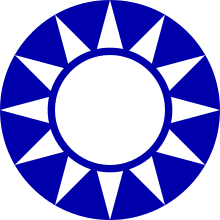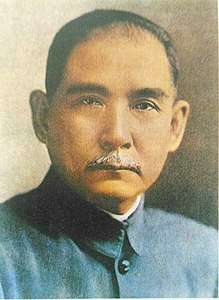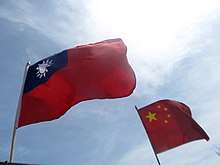Revolutionary Committee of the Chinese Kuomintang
Revolutionary Committee of the Chinese Kuomintang 中国国民党革命委员会 Zhōngguó Guómíndǎng Gémìngwěiyuánhuì | |
|---|---|
 "Blue Sky with White Sun" is the traditional symbol of the Kuomintang while RCCK uses portraits of Sun Yat-sen more[1] | |
| Abbreviation | RCCK |
| Chairperson | Wan Exiang |
| Founded | 1 January 1948 |
| Split from | Kuomintang |
| Preceded by | Left-wing of the Kuomintang |
| Headquarters | Beijing, China |
| Newspaper |
Tuanjie Bao (Solidarity/Unity Daily)[2] Tuanjie (Unity) |
| Membership (2017) | 127,930[3] |
| Ideology |
Socialism with Chinese characteristics Three Principles of the People Chinese unification Progressivism Left-wing nationalism Social democracy Democratic socialism Xi Jinping Thought[4][5] |
| Political position | Left-wing |
| National affiliation | United Front |
| National People's Congress |
89 / 2,987 |
| Standing Committee of NPC |
5 / 166 |
| Election symbol | |
 | |
| Website | |
| Official website | |
| Revolutionary Committee of the Chinese Kuomintang | |||||||
| Chinese name | |||||||
|---|---|---|---|---|---|---|---|
| Traditional Chinese | 中國國民黨革命委員會 | ||||||
| Simplified Chinese | 中国国民党革命委员会 | ||||||
| |||||||
| Abbreviation | |||||||
| Chinese | 民革 | ||||||
| |||||||
| Tibetan name | |||||||
| Tibetan | ཀྲུང་གོ་གོ་མིན་ཏང་གསར་བརྗེ་ཨུ་ཡོན་ལྷན་ཁང | ||||||
| |||||||
| Zhuang name | |||||||
| Zhuang | Cunghgoz Gozminzdangj Gwzming Veijyenzvei | ||||||
| Mongolian name | |||||||
| Mongolian Cyrillic | Дундад улсын гоминдангийн хувьсгалын зөвлөл | ||||||
| Mongolian script |
ᠳᠤᠮᠳᠠᠳᠤ ᠤᠯᠤᠰ ᠤᠨ ᠭᠣᠮᠢᠨᠳᠠᠩ ᠤᠨ ᠬᠤᠪᠢᠰᠬᠠᠯ ᠤᠨ ᠵᠥᠪᠯᠡᠯ | ||||||
| Uyghur name | |||||||
| Uyghur |
جۇڭگو گومىنداڭ ئىنقىلابىي كومىتېتى | ||||||
| |||||||
| Manchu name | |||||||
| Manchu script | ᠮᡳᠨᡬᡝ | ||||||
| Romanization | Ming'e | ||||||
The Revolutionary Committee of the Chinese Kuomintang (abbreviated RCCK) is one of eight registered minor political parties (in addition to the Communist Party of China) in the People's Republic of China.
It was founded in 1948 by left-wing members who broke with the main Kuomintang (KMT) during the Chinese Civil War, especially those who were against Chiang Kai-shek's policies. The party claims to be the true heir of Sun Yat-sen's legacy. By the end of June 2012, it had 101,865 members.[6] Party members increased by 26,065 from 2012 to 2017[3].
Its honorary chairperson Song Qingling served as Vice President of the People's Republic of China and Honorary President of the People's Republic of China. The chairperson Li Jishen served as vice chairman of the Central People's Government.
Among the officially sanctioned political parties of the People's Republic of China, the Revolutionary Committee is seen as second in status to the Communist Party of China. Thus, the Revolutionary Committee is allotted the second highest number of seats in the People's Political Consultative Conference (30%). It also owns numerous assets, some formerly owned by the Kuomintang, throughout mainland China. The Revolutionary Committee operates a range of party-owned institutions, such as party schools.
Chairpersons
- Li Jishen (李济深) (1948–1959)
- He Xiangning (何香凝) (1960–1972)
- Zhu Yunshan (朱蕴山) (1979–1981)
- Wang Kunlun (王昆仑) (1981–1985)
- Qu Wu (屈武) (1987–1988)
- Zhu Xuefan (朱学范) (1988–1992)
- Li Peiyao (李沛瑶) (1992–1996)
- He Luli (何鲁丽) (1996–2007)
- Zhou Tienong (周铁农) (2007–2012)
- Wan Exiang (万鄂湘) (2012–present)[7]
Honorary chairpersons
- Song Qingling (宋庆龄) (1948–1949)
- Qu Wu (屈武) (1988–1992)
- Zhu Xuefan (朱学范) (1992–1996)
- Hou Jingru (侯镜如) (1992–1994)
- Sun Yueqi (孙越崎) (1992–1995)
Provincial chairpersons
- Han Youwen - Chairman of the Xinjiang Branch[8][9]
References
- ↑ Chinese KMT Revolutionary Committee holds national congress. Retrieved 2018-03-05.
- ↑ "团结报数字报" (in Chinese). Retrieved 2018-01-11.
- 1 2 "【五年间】图说民革这五年——自身建设篇!-人民资讯-人民网". Minge.gov.cn (in Chinese). 2017-12-22. Retrieved 2018-01-11.
- ↑ "民革第十三次全国代表大会暨民革成立70周年纪念大会在京开幕 王沪宁代表中共中央致贺词-人民资讯-人民网". Minge.gov.cn (in Chinese). 2017-12-20. Retrieved 2018-01-11.
- ↑ "中国国民党革命委员会章程(2017年12月23日)-人民资讯-人民网". Minge.gov.cn (in Chinese). 2017-12-23. Retrieved 2018-01-11.
- ↑ Chinese KMT Revolutionary Committee holds national congress Archived 2014-01-10 at the Wayback Machine.. Retrieved 2012-12-13.
- ↑ "民革中央领导简介(包括现任领导、历届领导)-人民资讯-人民网" (in Chinese). Minge.gov.cn. 2017-12-24. Retrieved 2018-01-11.
- ↑ United States. Joint Publications Research Service (1985). China report: political, sociological and military affairs, Issues 19-24. Foreign Broadcast Information Service. p. 103. Retrieved 2011-04-0. Check date values in:
|accessdate=(help) - ↑ "Zhongguo ren ming da ci dian" bian ji bu (1994). Who's who in China current leaders. Foreign Languages Press. p. 185. ISBN 7-119-00725-4. Retrieved 2011-04-03.
